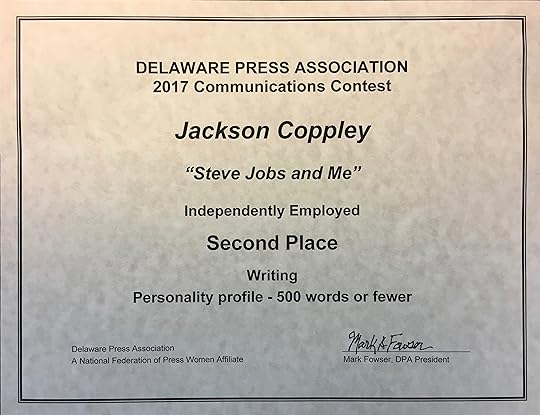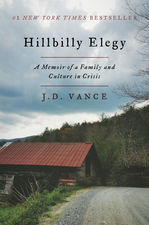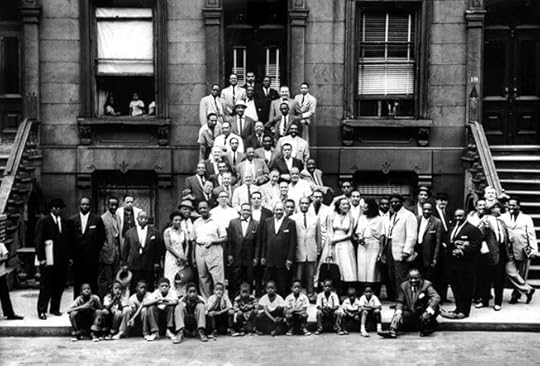Jackson Coppley's Blog, page 17
August 4, 2017
Award Winning Writing
 I’m pleased to announce that I’ve won an award for my writing from the Delaware Press Association. I took second place in the Personality Profile category for my blog piece Steve Jobs and Me. I invite you to visit my Blog and check out this award-winning article. Subscribe and you’ll receive an email whenever I post a new entry.
I’m pleased to announce that I’ve won an award for my writing from the Delaware Press Association. I took second place in the Personality Profile category for my blog piece Steve Jobs and Me. I invite you to visit my Blog and check out this award-winning article. Subscribe and you’ll receive an email whenever I post a new entry.
Published on August 04, 2017 10:55
July 24, 2017
The Shadow of the Evening
The Shadow of the Evening (L’Ombra Della Sera) is a novel that starts with a bucolic summer in rural Virginia for two cousins and ends with a suspicious death in Italy of one of the boys, Alexander, now a man and authority on the Etruscians. His cousin David must find what happened.Early on, the author described a pond at Ashland where the boys swam and I saw an example of rich, textural prose that allowed the reader to feel the ooze between his toes and the cool flow of the stream over his body on a hot summer day. That imagery carries forward into the book.I consider the novel three books: A bucolic summer spent by two boys. The decent into madness of a brilliant man. A mystery to validate a suicide. The second, Alexander’s succumbing to his sickness, I found interesting in that I knew before the chapter started he was schizophrenic. So I questioned what was real as the chapter progressed. The book becomes a page-turning with the unfolding investigation of Alexander’s death.
Published on July 24, 2017 08:13
June 19, 2017
The Movie in Your Mind
 When did we separate the movies from the written word? Most movies are based on books. A writer had a story to tell and painted an image in words for the reader to see. A director later took those imaginary images and rendered them on the screen.Before the motion picture, we had only words. Although most ancient people could not read a single word of their language, stories told by word of mouth entertained them. The storyteller was the most popular entertainer of the time, regaling folks with his tales. The stories unfolded in the listener's mind. The image was contained between the ears. If possible, actors recited the lines before an audience seated on stone in an amphitheater or, in the case of Shakespeare's time, people standing before a stage.Who coined the term 'suspension of disbelief'? It is true of the stage. It is true of the movies. It remains true of the written word. The cleaver artisan can take you to a different world or into the lives of others with whom you identify.Someone said the Greeks told all the stories. We just place each in a different setting, or if a movie, add expensive computer graphics to dazzle us. Yet the tales are the same. We root for good and jeer evil. We identify with the troubles and heartaches portrayed. Each of us takes something unique away from the experience. No matter how the story is conveyed, it creates the movie in your mind.
When did we separate the movies from the written word? Most movies are based on books. A writer had a story to tell and painted an image in words for the reader to see. A director later took those imaginary images and rendered them on the screen.Before the motion picture, we had only words. Although most ancient people could not read a single word of their language, stories told by word of mouth entertained them. The storyteller was the most popular entertainer of the time, regaling folks with his tales. The stories unfolded in the listener's mind. The image was contained between the ears. If possible, actors recited the lines before an audience seated on stone in an amphitheater or, in the case of Shakespeare's time, people standing before a stage.Who coined the term 'suspension of disbelief'? It is true of the stage. It is true of the movies. It remains true of the written word. The cleaver artisan can take you to a different world or into the lives of others with whom you identify.Someone said the Greeks told all the stories. We just place each in a different setting, or if a movie, add expensive computer graphics to dazzle us. Yet the tales are the same. We root for good and jeer evil. We identify with the troubles and heartaches portrayed. Each of us takes something unique away from the experience. No matter how the story is conveyed, it creates the movie in your mind.
Published on June 19, 2017 08:54
June 3, 2017
Hillbilly Elegy
 Hillbilly Elegy is a memoir combined with frequent statistical observations about life in Appalachia. The result is a thoughtful insight on an often forgotten segment of American society. Published prior to the November, 2016 presidential elections, the popularity of the book peaked when this ‘forgotten segment’ gained attention by voting to put the current President in office.I remember when Jack Kennedy ran for the presidency. I was just a kid, but recall his tours of Appalachia where he spoke of the government’s obligation to the people who lived there in poverty. Later, Lyndon Johnson carried that effort forward with The War on Poverty. It seems no one talks about the people in those hills much anymore.It’s easy to forget these people when so many major problems reside in the cities -- poverty, crime, drugs, slums, are just a few examples. While much focus remains on the urban minority communities, it is interesting to note that most food stamp recipients and drug addicts are white.In Hillbilly Elegy, J.D. Vance writes a personal story of life with his family in the hills of Kentucky. He traces the history of migration over the border from Kentucky to Ohio for factory jobs and the ultimate demise of those jobs in modern times. Vance explores the inner mind of the hillbillies who often blame their lot on others, never themselves. He is one of the few that broke the cycle of poverty by getting a good education and a law degree from Yale. His message is clear, however: in spite of a drug addict mother who had a series of men in her life with little time for good mothering, his escape from poverty came from the undying support of a tough grandmother and strong grandfather.He suggests that without some source of support and with a willingness to stop blaming others, the cycle of poverty will never be broken from the outside. I recommend the book as a depiction of one man’s personal story, but question what type of book it wanted to be. It is solid as a memoir, but somewhat uneven as a case study of the people in Appalachia.In spite of its unevenness, I recommend it. Particularly during these times, it is an important story to know.
Hillbilly Elegy is a memoir combined with frequent statistical observations about life in Appalachia. The result is a thoughtful insight on an often forgotten segment of American society. Published prior to the November, 2016 presidential elections, the popularity of the book peaked when this ‘forgotten segment’ gained attention by voting to put the current President in office.I remember when Jack Kennedy ran for the presidency. I was just a kid, but recall his tours of Appalachia where he spoke of the government’s obligation to the people who lived there in poverty. Later, Lyndon Johnson carried that effort forward with The War on Poverty. It seems no one talks about the people in those hills much anymore.It’s easy to forget these people when so many major problems reside in the cities -- poverty, crime, drugs, slums, are just a few examples. While much focus remains on the urban minority communities, it is interesting to note that most food stamp recipients and drug addicts are white.In Hillbilly Elegy, J.D. Vance writes a personal story of life with his family in the hills of Kentucky. He traces the history of migration over the border from Kentucky to Ohio for factory jobs and the ultimate demise of those jobs in modern times. Vance explores the inner mind of the hillbillies who often blame their lot on others, never themselves. He is one of the few that broke the cycle of poverty by getting a good education and a law degree from Yale. His message is clear, however: in spite of a drug addict mother who had a series of men in her life with little time for good mothering, his escape from poverty came from the undying support of a tough grandmother and strong grandfather.He suggests that without some source of support and with a willingness to stop blaming others, the cycle of poverty will never be broken from the outside. I recommend the book as a depiction of one man’s personal story, but question what type of book it wanted to be. It is solid as a memoir, but somewhat uneven as a case study of the people in Appalachia.In spite of its unevenness, I recommend it. Particularly during these times, it is an important story to know.
Published on June 03, 2017 09:25
May 23, 2017
Guys in White Hats
 When I was a kid, glued to the screen of a fourteen-inch black and white TV, the good guys wore white hats. Watching Wild Bill Hitchcock, Gene Autry, the Lone Ranger, I understood these men were righteous in every way.As an adult, glued to the screen of a sixty-inch high definition TV, the hero is hard to discern. Watching House of Cards or Billions, just as I assign a white hat to a character, they turn the tables on me. In House of Cards, Frank Underwood started out as my buddy. After all, he spoke directly to me, letting me in on what was really going on. Then, just as I cozied up to the character, he pushes someone to her death in front of a Metrorail train. Frank! What are you doing?Billions has a different twist. The main characters are an assistant attorney general and a super-rich hedge fund manager. The attorney general is the good guy, right? He’s fighting all the bad guys for us common citizens. The hedge-fund manager must be the bad guy as a member of the money-grubbing one percent. Yet, right off the bat, we see that the attorney’s relationship with his wife is based on sadomasochism, and the rich guy’s been married forever to his childhood sweetheart and is faithfully dedicated to her and the two boys. Seems we have a different relationship here.But isn’t that more realistic? When we put people in boxes and paint them with one color, we forget the textures of human nature.Nationalism and politics thrive on the use of a single color. It simplifies things. Our side wears the white hat. Sorry about yours. Perhaps we can look deeper. I hope that, as in TV, black and white is dead. We now use high definition.
When I was a kid, glued to the screen of a fourteen-inch black and white TV, the good guys wore white hats. Watching Wild Bill Hitchcock, Gene Autry, the Lone Ranger, I understood these men were righteous in every way.As an adult, glued to the screen of a sixty-inch high definition TV, the hero is hard to discern. Watching House of Cards or Billions, just as I assign a white hat to a character, they turn the tables on me. In House of Cards, Frank Underwood started out as my buddy. After all, he spoke directly to me, letting me in on what was really going on. Then, just as I cozied up to the character, he pushes someone to her death in front of a Metrorail train. Frank! What are you doing?Billions has a different twist. The main characters are an assistant attorney general and a super-rich hedge fund manager. The attorney general is the good guy, right? He’s fighting all the bad guys for us common citizens. The hedge-fund manager must be the bad guy as a member of the money-grubbing one percent. Yet, right off the bat, we see that the attorney’s relationship with his wife is based on sadomasochism, and the rich guy’s been married forever to his childhood sweetheart and is faithfully dedicated to her and the two boys. Seems we have a different relationship here.But isn’t that more realistic? When we put people in boxes and paint them with one color, we forget the textures of human nature.Nationalism and politics thrive on the use of a single color. It simplifies things. Our side wears the white hat. Sorry about yours. Perhaps we can look deeper. I hope that, as in TV, black and white is dead. We now use high definition.
Published on May 23, 2017 11:25
April 25, 2017
The Story of J
 I picked up the latest Esquire magazine. The cover features Javier Bardem and an ad for the latest Alfa Romeo, the Giulia. Perhaps I’m sensitive to what I consider the most abused letter of the alphabet, the letter J, because my name begins with one; but, consider for a moment those two names: Javier and Giulia. The first is a J masquerading as an H and the other, a Giu posing as a J. Such abuse to a letter on the same page! It poses a problem should a writer ever see Javier in a Giulia.The letter J has not been with us always. A Google search shows that the letter was introduced in the 17th Century. The Italians had their Giu for that sound and ignored the J, thank you very much. However, other languages such as Spanish treated it as a different sound. The poor J, it’s the harlot of the alphabet. It will be whatever you want it to be.If the J wasn’t invented until the 17th century, what were the biblical names with J’s before then? There’s Joshua, James, Joseph, and, of course, Jesus. For that answer,I’m proud to have a name starting with a J. If for no other reason, little kids, like my grandson, like the way it feels to say it. It has a sharp beginning that's good to utter. I see a smile every time a kid says it. That’s enough for me.
I picked up the latest Esquire magazine. The cover features Javier Bardem and an ad for the latest Alfa Romeo, the Giulia. Perhaps I’m sensitive to what I consider the most abused letter of the alphabet, the letter J, because my name begins with one; but, consider for a moment those two names: Javier and Giulia. The first is a J masquerading as an H and the other, a Giu posing as a J. Such abuse to a letter on the same page! It poses a problem should a writer ever see Javier in a Giulia.The letter J has not been with us always. A Google search shows that the letter was introduced in the 17th Century. The Italians had their Giu for that sound and ignored the J, thank you very much. However, other languages such as Spanish treated it as a different sound. The poor J, it’s the harlot of the alphabet. It will be whatever you want it to be.If the J wasn’t invented until the 17th century, what were the biblical names with J’s before then? There’s Joshua, James, Joseph, and, of course, Jesus. For that answer,I’m proud to have a name starting with a J. If for no other reason, little kids, like my grandson, like the way it feels to say it. It has a sharp beginning that's good to utter. I see a smile every time a kid says it. That’s enough for me.
Published on April 25, 2017 08:04
April 20, 2017
Women Who Play
 I learned to play the piano as a young man. Never spent the time needed to be good, and the lack of talent held me back as well. I’ve started working more on my playing with the aid of an expert. I intend to, at the very least, satisfy myself. Years ago, life was unlimited in length. Now, you can see the end somewhere in the distance. Recent experience shows me that playing can serve me well to the end.Years ago I heard Marian McPartland at Strathmore. It was her 88th birthday, so easy for me to remember since she was playing the 88’s (The number of keys on a piano). She was the only white woman in the famous photo A Great Day in Harlem (above) and her talent at the keyboard was enough to place her among jazz greats featured in that shot.Last night, I took in Lenore Raphael at Bethesda Blues and Jazz Club. She played a tribute concert for Oscar Peterson. Turns out that she wrote one of his songs. I searched the Internet and found she is 74. I don’t think I’ll be up to her standard by that age, but can’t hurt to try. Getting part way there would be great.So, here’s to the women who play for showing the way.Photo Credit:https://en.wikipedia.org/w/index.php?curid=6765812
I learned to play the piano as a young man. Never spent the time needed to be good, and the lack of talent held me back as well. I’ve started working more on my playing with the aid of an expert. I intend to, at the very least, satisfy myself. Years ago, life was unlimited in length. Now, you can see the end somewhere in the distance. Recent experience shows me that playing can serve me well to the end.Years ago I heard Marian McPartland at Strathmore. It was her 88th birthday, so easy for me to remember since she was playing the 88’s (The number of keys on a piano). She was the only white woman in the famous photo A Great Day in Harlem (above) and her talent at the keyboard was enough to place her among jazz greats featured in that shot.Last night, I took in Lenore Raphael at Bethesda Blues and Jazz Club. She played a tribute concert for Oscar Peterson. Turns out that she wrote one of his songs. I searched the Internet and found she is 74. I don’t think I’ll be up to her standard by that age, but can’t hurt to try. Getting part way there would be great.So, here’s to the women who play for showing the way.Photo Credit:https://en.wikipedia.org/w/index.php?curid=6765812
Published on April 20, 2017 10:08
April 12, 2017
Leaving Lisa - The Movie
 The Book Pipeline Competition is an annual search for books that have the promise of attracting a movie deal.Leaving Lisadid not make the cut this year. Too bad, right? No, not altogether. Let me tell you why.I remember an author getting rejection letters from agents, but one took the time to explain why. That author appreciated it for two reasons. First, the agent valued the book enough to take the time for a response. In a business where there is an avalanche of writing in the in-basket, it means something to be picked from the drift. Second, the agent provided expert criticism. A critique coming from a professional is valuable. Although I enjoy praise, it dwells on the strengths and forgives the weaknesses.I received a critique from a judge at The Book Pipeline that provided the value my author friend depicted. It’s fantastic they read the material. When you send something to an agent, they read the first page and pass judgment. The critique I received made apparent that they dug deeper.So, what did it say? Nope, not going there. It’s just for me. I will give one tidbit: I made the main character remote and his first-person narrative in short sentences by design, but the judge thought this made him off-putting as a character. True, people dislike Jason. They love the character I gave more depth, Irina. Now, for a movie in particular, the judge believed Jason needed more attraction. Duly noted.So, althoughLeaving Lisamay not be coming to a screen near you soon, it remains a good read, and critiques like the one received will make my next novel (under development) even better.
The Book Pipeline Competition is an annual search for books that have the promise of attracting a movie deal.Leaving Lisadid not make the cut this year. Too bad, right? No, not altogether. Let me tell you why.I remember an author getting rejection letters from agents, but one took the time to explain why. That author appreciated it for two reasons. First, the agent valued the book enough to take the time for a response. In a business where there is an avalanche of writing in the in-basket, it means something to be picked from the drift. Second, the agent provided expert criticism. A critique coming from a professional is valuable. Although I enjoy praise, it dwells on the strengths and forgives the weaknesses.I received a critique from a judge at The Book Pipeline that provided the value my author friend depicted. It’s fantastic they read the material. When you send something to an agent, they read the first page and pass judgment. The critique I received made apparent that they dug deeper.So, what did it say? Nope, not going there. It’s just for me. I will give one tidbit: I made the main character remote and his first-person narrative in short sentences by design, but the judge thought this made him off-putting as a character. True, people dislike Jason. They love the character I gave more depth, Irina. Now, for a movie in particular, the judge believed Jason needed more attraction. Duly noted.So, althoughLeaving Lisamay not be coming to a screen near you soon, it remains a good read, and critiques like the one received will make my next novel (under development) even better.
Published on April 12, 2017 07:40
April 10, 2017
Three Years a Writer
[image error]Facebook has an interesting way of reminding you of the past. I’m talking about the system posting on your page a photo from X number of years ago. It’s a mini-anniversary of a point in you life that was, at the very least, worthy of a snapshot. Today, Facebook posted a picture of me from three years ago beaming over the receipt of the proof of my first book. It was special. So much so, I’m spending a little time and ink to reflect.Making your first book a reality proves you can do it. Not think about it, muse about it, take a stab at it, but do it. That’s not unimportant. Now, how about doing it well? Ah, that’s a journey. I know that the next thing I wrote, my novel, was better written than the first, a trilogy of short stories, and I’m sure the next thing, the novel I’m writing now, will be even better.The past three years has been an education in the business of writing. It’s a changing landscape as anyone can see by walking down the street. What happened to all those bookstores? Gone. How about the gatekeepers, the agents and the publishers? Authors are bypassing them. That’s good news and bad. Mainstream publishers guarantee quality. You’re unlikely to get a misspelled word in a book under the Scribner name, and it will be readable. Self-published authors are a risk and only those who read a lot venture into that ocean of the unknown. But rewards await those who do.However, one thing remains true from the beginning of my first three years to today. That is why I write. Over and over, from Steven King to Joe Schmo, authors tell you they write because they must. Whether it is the love of writing or personal compulsion, they must. Me too.(Of course, if someone reads it, that’s not a bad thing.)
Published on April 10, 2017 15:02
April 5, 2017
Moonglow
 I’ve been a fan of Michael Chabon ever since The Amazing Adventures of Kavalier and Clay. That book made me read his earlier work, The Mysteries of Pittsburgh, a book showing the promise Chabon ultimately achieved. I tried to read The Yiddish Policemen’s Union, twice. Ellen liked it, but I stopped halfway on my second attempt. So, his work represents some unevenness to my taste.Which brings me to Moonglow. Ellen couldn’t get into it, but I enjoyed it. I doubt Chabon principal aim is to satisfy the tastes of the Coppley family (Ellen and I both loved Kavalier and Clay), you may love Moonglow or leave it, based on our experience. However, true to Chabon’s skill, I doubt the writing itself will disappoint.Moonglow consists of tales from his grandfather, a man nearing the end of his life and who recounts events to his grandson he’s never heard before. The book starts with a disclaimer that some things are true and some is made up, but since I wasn’t after a memoir, who cares?His grandfather was a troublemaker as a lad, who later became fascinated by rockets and space travel. He entered World War II as something of a spy, parachuting into Europe hunting for Werner Von Braun. Now, that sounds like an adventure novel. No, it’s not that, but it does lend an interesting narrative to the war. The book bounces back and forth in the grandfather’s life. So, you may read about the war interleaved with his adventures hunting a snake loose in his retirement village.All throughout, Chabon presents wordsmithing that brings a smile to the reader. I recommend it. (Sorry Ellen.)
I’ve been a fan of Michael Chabon ever since The Amazing Adventures of Kavalier and Clay. That book made me read his earlier work, The Mysteries of Pittsburgh, a book showing the promise Chabon ultimately achieved. I tried to read The Yiddish Policemen’s Union, twice. Ellen liked it, but I stopped halfway on my second attempt. So, his work represents some unevenness to my taste.Which brings me to Moonglow. Ellen couldn’t get into it, but I enjoyed it. I doubt Chabon principal aim is to satisfy the tastes of the Coppley family (Ellen and I both loved Kavalier and Clay), you may love Moonglow or leave it, based on our experience. However, true to Chabon’s skill, I doubt the writing itself will disappoint.Moonglow consists of tales from his grandfather, a man nearing the end of his life and who recounts events to his grandson he’s never heard before. The book starts with a disclaimer that some things are true and some is made up, but since I wasn’t after a memoir, who cares?His grandfather was a troublemaker as a lad, who later became fascinated by rockets and space travel. He entered World War II as something of a spy, parachuting into Europe hunting for Werner Von Braun. Now, that sounds like an adventure novel. No, it’s not that, but it does lend an interesting narrative to the war. The book bounces back and forth in the grandfather’s life. So, you may read about the war interleaved with his adventures hunting a snake loose in his retirement village.All throughout, Chabon presents wordsmithing that brings a smile to the reader. I recommend it. (Sorry Ellen.)
Published on April 05, 2017 09:05



